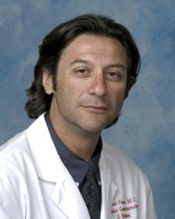Celiac disease, an autoimmune reaction to gluten, a protein found in wheat, rye, and barley, affects about one percent of the population and 3 million Americans. In spite of this statistic, the disease remains one of the least-researched autoimmune disorders and is in fact the only one not supported by government funding. In the face of such an absence of knowledge, Dr. Alessio Fasano of the Center for Celiac Research at the University of Maryland has stepped forward, conducting studies which will surely influence and encourage future studies of celiac disease and may lead the way to a new form of treatment.
As an author, researcher, and gluten-free advocate, I work to raise awareness for celiac disease because with increased awareness comes more research, more diagnoses, and even better treatments. Illustrating this is the work of Dr. Alessio Fasano, a professor of pediatrics, medicine and physiology as well as the director of the Mucosal Biology Research Center and the Center for Celiac Research at the University of Maryland, who is at the forefront of celiac disease research, especially with regard to intestinal “permeability.” In Scientific American, Dr. Fasano poses in his article, “Surprises from Celiac Disease,” the question of why some celiacs develop the disease later than others, even though celiacs all have a genetic predisposition to it. The answer he offers has the potential to cause big changes for celiacs—the possibility of the development of a new treatment plan and even possibly a method of prevention.
According to Dr. Fasano, different onsets among celiacs is associated with the microbiome—that is, the community of bacteria or microbes which live in the digestive tract. Dr. Fasano explains that the microbiome varies among different people and even in the same individual over time. Furthermore, Dr. Fasano says these microbes can have an effect on the genes which are active in their host. Therefore, someone genetically predisposed to celiac disease may have been able to handle gluten for a long time, but upon a shifting of the microbiome, and a subsequent activation of the gluten intolerance gene, the symptoms of celiac disease will appear.
Celiac disease works by attacking the villi, the finger-like structures which line the small intestine, resulting in stomach problems and malabsorption of nutrients. Left untreated, the disease can cause serious health problems, such as osteoporosis, anemia, mental illness, miscarriage, and even cancer. For years I went from doctor to doctor trying to find the cause of my painful symptoms. Finally, I researched my symptoms on my own and was then properly diagnosed with celiac disease. I’m thankful for the correct diagnosis; however, managing the gluten-free diet is a challenge. The prospect of a treatment such as probiotics to handle genetic factors is, not surprisingly, appealing; even though the treatment for celiac disease is simple, it demands a lot of work and can be disheartening, requiring a total lifestyle change, time, and dedication.
With Dr. Fasano’s celiac disease research, we have more research to look forward to, as well as more awareness and perhaps another treatment option and preventative measures. Meanwhile, let’s keep doing our parts to raise awareness and funds for celiac disease research.
Tina Turbin
k.m.
Resource:
Fasano, Alessio. “Surprises from Celiac Disease.” Scientific American: Aug 2009.
From our home to yours, Tina Turbin
If you have any questions or suggestions just email me at Info (at) TinaTurbin (dot) com.








